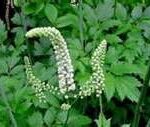 Researchers from Johann Wolfgang Goethe University of Frankfurt/Main, in Hanau, Germany, reviewed the evidence and believe the risk is less than suspected.
Researchers from Johann Wolfgang Goethe University of Frankfurt/Main, in Hanau, Germany, reviewed the evidence and believe the risk is less than suspected.
First, the details.
- 69 reports of liver disease suspected to be caused by black cohosh (aka Actaea racemosa and Cimicifuga racemosa) were reviewed and analyzed.
- The sources of the reports were 11 published case reports and 58 spontaneous reports to national regulatory agencies.
And, the results.
- Re-evaluation raised serious doubts about the ability of black cohosh to cause liver disease.
- The reports that served as the sources of the reaction were of poor quality.
- There were major inconsistencies for the same patient regarding reported data.
- All cases had confounding variables such as…
- Quality of reported data
- Uncertainty of the black cohosh product, quality, and identification
- Undisclosed indication for it’s use
- Insufficient adverse event definition
- Lack of temporal association and dechallenge (did the reaction resolve when black cohosh was discontinued?)
- Missing or inadequate evaluation of alcohol use or the presence of other drugs and diseases
- Failure to re-exposure test to black cohosh, and alternative cause of the patient’s condition
The bottom line?
The authors concluded, “The presented data do not support the concept of hepatotoxicity in a primarily suspected causal relationship to the use of black cohosh.”
In other words, conclusive proof of a cause and effect relationship between black cohosh and liver toxicity is not available.
“Nonetheless,” MayoClinic.com advises, “Patients with liver disease should consult a licensed healthcare professional before using black cohosh.”
4/17/10 20:15 JR